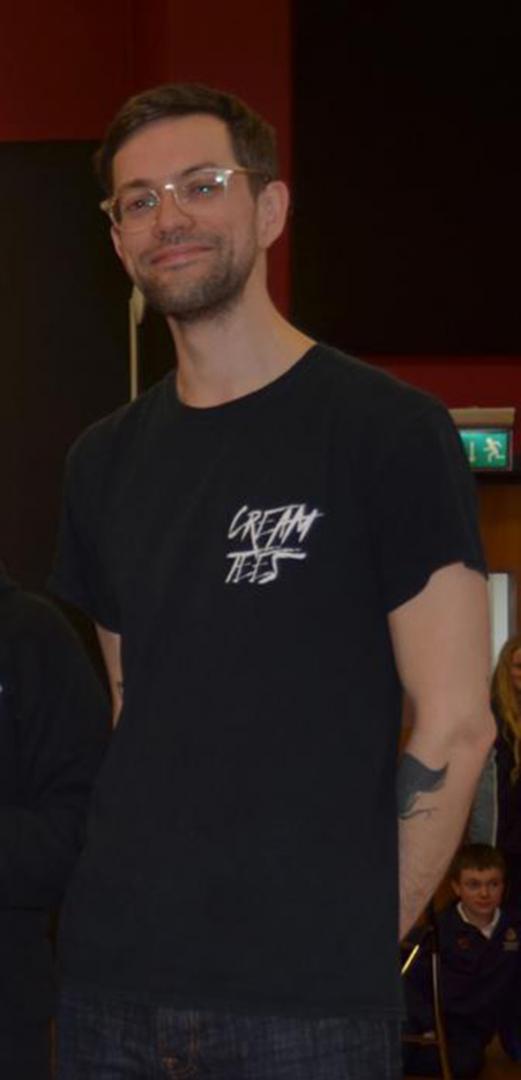Rupert Philbrick has gone from being a member of Turrets Youth Theatre to running the group, a role he combines with involvement in the Music at the Heart of Teesdale project and its Cream Tees folk group
Do you prefer the stage or music – or is it a case of the best of both worlds?
I think it’s fair to say that music, or sound, will always be my first love – and perhaps where I feel most at home in terms of making, but it’s in theatre that all the different things I do creatively sit together.
What first attracted you to youth theatre?
My family moved here in 1990, and I remember being taken at a young age to an early Castle Players performances of the Merry Wives of Windsor in the castle grounds. I was entranced by the tale as it unfolded. It was experiences like this, and seeing rural touring theatre by the likes of Jack Drum Arts that were fundamental in inspiring me to get involved with youth theatre. For a while there was a youth theatre group in Mickleton called “Micky Drams” . Soon after, I signed up to Turrets and things just grew (and continue to grow) from there.
What was your first experience of performance when you were a young member of The Turrets?
I think some of the earliest performances I was involved with were devised and written by the group under the direction of Jill Cole, who ran the group during the ten or so years I was a member. The earliest role I remember was from Unplugged, a story of a dystopian future where machines have taken over the world and people have forgotten how to communicate with each other.
The most memorable experiences of being with the group came later. There was a series of very fruitful collaborations with Jackass Youth Theatre, based in Crook.
Do you still get the chance to perform on stage?
Not as much as I’d like to. These days performing comes more under the guise of being on stage playing music with Cream Tees, or dancing out with Black Sheep Border Morris. More recently, my work tends to find me more often behind a tech desk than on stage but I’d like to start doing more performative work again.
In the current climate post-lockdown and dealing with the ongoing Covid-19 situation and the massive impact it’s had on the performing arts industries, I’m really interested in exploring opportunities for outdoors performances – which feels like one of the only viable options for the sharing of work currently. Digital technologies in terms of light & sound have never been more portable so I like the idea of staging epic, immersive walks across Teesdale, that quite literally take the audience on a journey through a ‘storied’ landscape.
The Turrets has been around for quite some time – how do you explain its continuing popularity?
Turrets Youth Theatre has existed now for over 20 years, providing continued access for young people in Teesdale to engage with the performing arts. A lot can be said for being a sustained presence in a small community – but aside from an established track record, offering exciting and engaging opportunities for participants, I think Turrets has always been a bit of a sanctuary for young people from across the dale.
I think now more than ever, the offer of groups like Turrets is even more of a life-line for young people. When creative curriculums have been systematically downsized by successive governments, opportunities to meet, make and engage with the arts on a community and professional level is essential. There’s still very little support and guidance for young people considering further education and careers in the arts – and so Turrets ensures that participants get to learn from and make work with other professional artists.
How did you get involved with Music at the Heart of Teesdale (M@HoT)?
As with most stories relating folk music, mine begins in a pub. During my time at university in London studying fine art, I lived with an amazing group of musicians and between lectures, coursework and other (extra) curricular activities had started to write music and it was what I then thought of as folk; songs that told a story, set to acoustic-ish music. Fast-forward to 2012, having finished uni (including 6-months living in a cabin in the woods in Sweden, the catalyst to my return to Teesdale) and I had started recording and performing this material under the name Little Alaska.
One night in a pub having finished my set, an old man accosted me at the bar saying “I don’t know what you think that music is, but it sure as heck isn’t folk music!” – and rather than argue, I was left with this big question – “If what I had been playing wasn’t folk music, then what was?”
At the time I had been commissioned by Artworks in Teesdale and the Heart of Teesdale Landscape Partnership to create a film that traced seasons of life in dales. I was aware of M@HoT’s early work establishing Cream Tees as a youth folk band, and their on-going research into music from the region – and I thought here presented a perfect opportunity to discover what the old man in the pub had meant when he talked about ‘folk’. So having met project co-founder Neil Diment, I offered my services as a volunteer to the project, exchanging the skills and experience I had in performance and music for a chance to learn alongside the group about traditional music and the true meaning of folk
Why is it important to celebrate the dale’s musical heritage?
I don’t think it’s just about the music – but cultural traditions, history and heritage on a much wider scale. One of the things I became more and more aware of when I first came back to Teesdale, was actually how little I knew about the place I had grown up in.
Through the work I became involved with, I was offered a chance to get to grips with what felt like Teesdale’s hidden histories, and to start joining the dots between local folk traditions, community knowledge and Teesdale’s place in UK (and global) history.
So really, the driving force behind all the work I do now is to find ways to connect young people and the wider community with the landscape around them.
As well as playing for enjoyment, what is the aim of youth folk group Cream Tees?
The starting point for Cream Tees was about engaging a new, younger generation of musicians in playing traditional folk music. At the project’s outset in 2011, it was felt that the folk scene had in some way died out in the dale, and knowledge of local songs and tunes had all but disappeared. Through M@HoT co-founder Mike Bettison’s research, scouring archives across the UK and the USA, what began with a single song “Fourpence a Day” has unravelled into a web of over 80 recordings, transcriptions and observations made by a series of world renowned folk ethnographers over a 120+ year period. So really, the band is about creating a platform for these music and dance traditions to be seen and heard again.
Did you imagine Cream Tees would produce new original music and play at festivals all across the country?
At the point I got involved with the group, they had just recorded and premiered their first CD – the Rooted Suite – a series of five pieces of music that were written in response to key historical and geographical locations around Teesdale. I don’t know if the group were conscious of the feat they had already accomplished, but in the following 18-24 months we were to start taking the band to major venues like Sage, Gateshead and to UK festivals including Towersey, in Oxfordshire, and Sidmouth (on the south coast) to share the music the band had created. These tunes are still firm favourites years later, there’s a real sense of pride and ownership over the material they’ve created and the other music taught that has been adopted as our own.
How have the events of 2020 affected both The Turrets and Cream Tees?
I think it’s fair to say that 2020 wasn’t the year that many of us were expecting. Turrets made a massive start to the year in co-creating the Northern Heartlands funded The Wearing of Water with myself and a team of artists from January-March; similarly Music at the Heart of Teesdale were coming to the closing stages of the Ceilidh Project, and our most recent ACE-funded project Music For/Dancing to Music, as well as establishing a new youth folk band at Wolsingham School called Wear’d Aliens.
When we knew that we were approaching lockdown, it was amazing to hear a resounding request from the young people in both groups that something could continue to be offered digitally in place of our regular sessions. For Cream Tees & Wear’d Aliens, this took the form of weekly Youtube tutorials leading up to two collaborative video performances we created for the Whitby Folk Week Online back in August.
For Turrets, we set out on an epic project co-ordinated by Company Three, a London-based youth theatre called The Coronavirus Time Capsule.
Together with over 100 other youth theatres from across the globe, we met weekly during lockdown on Zoom, running workshops and virtual versions of our usual drama activities – as well as creating a space that felt the slightest bit normal, and a chance to share experiences and ideas during all the weirdness of lockdown.
The group were challenged to create a series of video diaries, with each week giving a new theme to explore and develop work around. Each participant took responsibility for filming their own content and I then edited this together before publishing each video.
During this time, the group also contributed to an in-depth research process led by the Royal Central School of Speech and Drama into the impact that Lockdown was making on the lives of young people in Britain, meeting weekly with research assistant Elana Shyong and myself to un-pick the creative processes involved in the project and in Turrets, as well as making observations on the positive impact the group has on mental health and well-being for its participants.










